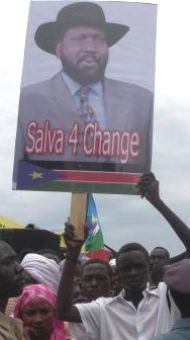Darfur rebels should reunite to get peace – Salva Kiir
August 14, 2009 (KHARTOUM) – The Sudanese First Vice-President urged Darfur rebel movements to unite in order to reach a negotiated settlement of the six year conflict in western Sudan.

In remarks he made in Damazin on Wednesday during his visit to the Blue Nile state, the head of southern Sudan government said the number of rebel factions in Darfur reached 28 groups.
“The government can’t negotiate with 28 delegations from the Darfur movements. They should unite in order to have one delegation when they go for peace negotiations with GONU,” he said.
“Their anger makes them create all these movements. But if they get a leadership, they can discuss their issues,” he further stressed.
Kiir harsh speech on the rebel groups in Darfur comes at a time where the Doha peace process is deadlocked due to the refusal of two main groups to engage peace talks with the government for different reasons.
The Sudan Liberation Movement of Abdel Wahid Al-Nur rejects any talks before to resolve the security concerns of some 2.7 million internally displaced persons. The group demands the disarmament of government militias and the return of the IDPs to their villages.
The Justice and Equality Movement of Khalil Ibrahim accepted the principal of talks but requires the implementation of a goodwill agreement signed with Khartoum and particularly the improvement of humanitarian situation and the release of its fighters detained by the Sudanese government.
Further the meddling of neighboring countries once again complicates the peace process. Libya and Egypt who were supposed to help the efforts of the mediation are now taking contradictory initiatives disturbing the efforts of the mediation.
Also, the SPLM was supposed to play a role in the resolution of the conflict but the continuous troubles with the National Congress Party led its peace partner to suspect any move undertaken in this issue and frozen its efforts.
(ST)
